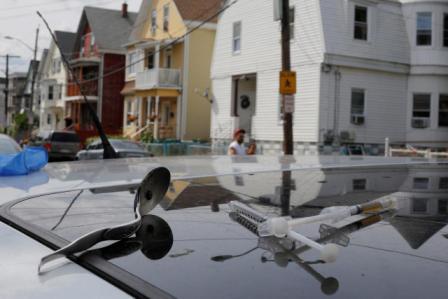
Less than one third of teens and young adults who overdose on opioids receive addiction treatment afterward, and the few who do get help receive counseling instead of medication to combat substance misuse, a U.S. study suggests.
Researchers examined data on more than 4 million youths aged 13 to 22 with coverage through Medicaid, the government insurance program for the poor, between 2009 and 2015. During that period, 3,791 young people had nonfatal opioid overdoses.
In the month after overdoses, 69% of these teens and young adults didn’t receive any addiction treatment, researchers report in JAMA Pediatrics. While 29% did get help, nearly all of them received only behavioral health services. Just 2% received anti-addiction medications that are considered the gold standard for combatting opioid abuse.
“It is unacceptable that so few youths are receiving the recommended treatment after opioid overdose,” said lead study author Dr. Rachel Alinsky of Johns Hopkins University School of Medicine in Baltimore.
“In pediatrics, we would not accept it if only 1 in 50 youth with asthma got the standard treatment when they came into the emergency department, or if 1 in 50 youth with diabetes got the standard treatment if they were hospitalized,” Alinsky said by email.
Roughly one in four overdoses involved heroin. The remainder were caused by misuse of other forms of prescription or illegal opioids.
Youth who used heroin were more than twice as likely to have repeat overdoses during the study.
Within 30 days of a heroin overdose, 4.1% of young people had another overdose, and within three months, 8.1% of them had a repeat overdose, the study found.
Among youth whose initial overdose involved other types of opioids, 1.2% had a repeat overdose within 30 days and 2% had a recurrence within 90 days.
Despite higher rates of repeat overdose, youth with heroin overdoses were 35% less likely to receive any addiction treatment than youth who overdosed on other types of opioids.
Less than 10% of the youths who had overdoses were diagnosed with opioid use disorder, the study also found. Even among those with heroin overdoses, less than half got this diagnosis.
A combination of factors may make it hard for young people to receive opioid addiction drugs, Alinsky said.
Pediatricians may not be familiar with treatments for opioid use disorder, and many clinicians who treat this condition may not accept younger patients, Alinsky said. Some providers may also be resistant to treating drug addiction with prescription medications.
“There is widespread stigma against medication for opioid use disorder within the healthcare and recovery communities, who sometimes inaccurately view medication for opioid use disorder as replacing one drug with another,” Alinsky said. “This stigma may be even stronger when it comes to prescribing medication to adolescents, where a common view is that medications should be used as a last resort despite the evidence-based guidelines from the American Academy of Pediatrics that recommend its use.”
All of this can put parents in a position where they have to push hard to get their children needed care, said Lucas Hill of the University of Texas at Austin College of Pharmacy.
“Given the increasing prevalence of ultra-potent synthetics in the illegal opioid supply, initiating medications immediately after a non-fatal overdose should be the top priority for any family,” Lucas, who wasn’t involved in the study, said by email. “Available evidence indicates these medications are far more effective than other treatment approaches, such as medically-supervised withdrawal (i.e. detox).”
When patients don’t get medications in the hospital where they receive overdose treatment, Hill advised, parents should seek out further care. In the U.S., they can search on the Department of Health and Human Services website findtreatment.gov for local providers who can prescribe buprenorphine.
“I would call until I found an active prescriber who accepted my insurance, would consider initiating medication on the day of our first visit, and could schedule that first visit within a few days,” Hill said.
Source: Reuters
 FR
FR EN
EN AR
AR








